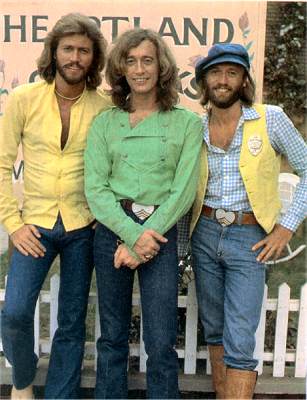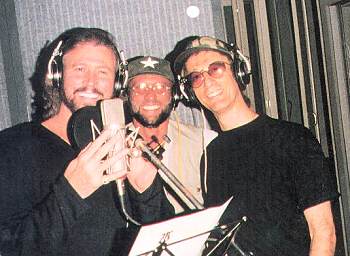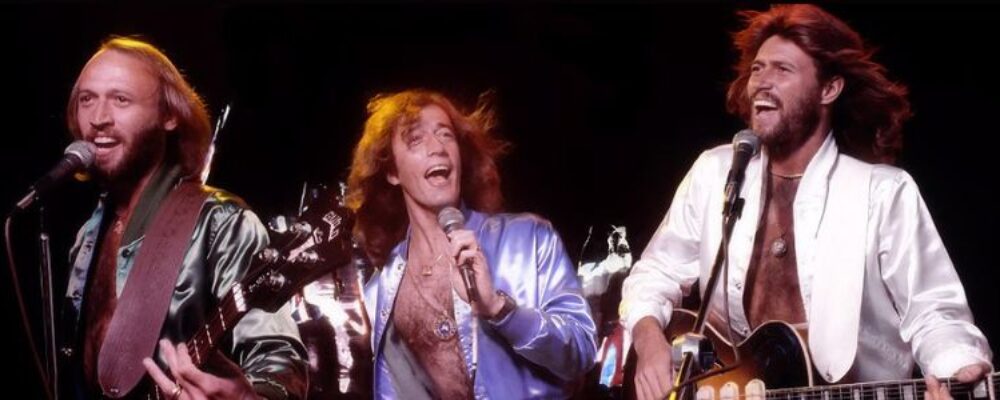Legends : Bee Gees

Copyright 1999. VH1 incorporated
Transcription Copyright 2002 by Janel Clayton Miller.
SEGMENT 5
NARRATOR: Stigwood was determined to maintain the momentum of “Saturday Night Fever” and “Grease” with another pop film and double album. But “Sergeant Pepper’s” was a fiasco. A critical and commercial flop so big, it threatened to wipe out the huge profits RSO had made on “Fever” and “Grease”. Worst of all, after so much success, it stuck the Bee Gees with a stigma they had shaken years before, second rate Beatles.
CLIP FROM THE FILM SOUNDTRACK
BARRY: Everything was so disjointed with the story. We were, we were, literally begged at one time to be let go from the film because we didn’t feel it any relevance the film whatsoever. It was the best of times, it was the worst of times
ROBIN: It was the worst. It was the best of times, we had the worst of films.
CLIP OF “EMOTION”, FIRST BY SAMANTHA SANG AND LATER THE BEE GEES
NARRATOR: In 1980, the Gibb Brothers found themselves the prime target of the Disco Sucks movement. Radio stations began advertising their Bee Gee free weekends and a record burning ceremony was held in Chicago.
MAURICE: When a phenomenon like that happens, so huge, people get really tired, very quickly. After awhile they go ‘enough’s enough’. So you start taking the piss. It was becoming a joke now.
ROBIN: You could spin the dial at anytime and hear a song from “Saturday Night Fever” on every radio station at any given moment. With exposure like that, there had to be an inevitable backlash.
MAURICE: But at the same token, we were very proud of those songs, they’re like our kids and when it’s treated badly, you’d get hurt.

NARRATOR: In the wake of the “Sergeant Pepper” fiasco, the brothers had a falling out with Stigwood. They made an independent audit of RSO Records and discovered that they were owed royalties. They filed a very public 200-million dollar lawsuit against him, claiming mismanagement and unfair enrichments.
BARRY: What we learned that is if you take issue and if you have genuine arguments with the people that represent you and people responsible for getting your records to the public, you’re on really dangerous ground.
NARRATOR: The lawsuit was later settled out of court with public apologies from both sides.
BARRY: All the problems were settled but the momentum had been lost. We lost our team.
NARRATOR: In 1981 the Bee Gees put out their last album for RSO Records, “Living Eyes”, an attempt to move away from their disco, falsetto style. In the midst of the backlash and the lawsuits the album went unnoticed.
CLIP OF “LIVING EYES”, BY THE BEE GEES
NARRATOR: Just two years after they were the best-selling act in the world, the Bee Gees decided theyhad to step out of the spotlight. The brothers Gibb produced entire albums for other artists, including “Guilty” for Barbara Streisand.
CLIP OF “GUILTY”, BY BARBARA STREISAND & BARRY GIBB
BARRY (1980): It was never exactly planned, let’s go do something that’s not the Bee Gees but it is the Bee Gees music. It was a request on their part and we did it.
CLIP OF “GUILTY”, BY BARBARA STREISAND & BARRY GIBB
NARRATOR: It became the biggest selling album of Streisand’s career. The brothers wrote and produced “Heartbreaker” for Dionne Warwick, “Chain Reaction” for Diana Ross, and “Eyes That See in the Dark” for Kenny Rogers, featuring the Dolly Parton duet “Islands in the Stream”.
CLIP OF “ISLANDS IN THE STREAM”, BY KENNY ROGERS & DOLLY PARTON
NARRATOR: It became one of the biggest country singles of all time.
CLIP OF “YOU WIN AGAIN” BY THE BEE GEES
NARRATOR: It was a bizarre situation. People didn’t want to admit they liked the Bee Gees. Yet records written by the Bee Gees, produced by the Bee Gees and sounding like the Bee Gees kept becoming best sellers. Meanwhile, younger brother Andy’s career was in desperate times.
CLIP OF “(OUR LOVE) DON’T THROW IT ALL AWAY”, FIRST SUNG BY ANDY GIBB, ABD LATER THE BEE GEES.
NARRATOR: After his initial success in the late 70’s, Andy had developed a terrible drug problem.
MAURICE: It was like talking to a brick wall. I remember being with him in Malibu in this lovely house on the beach and saw his Porsche outside the driveway. I said, ‘this is all really nice stuff Andy’ and he said ‘yeah, yeah it’s good’, and I said, ‘but you’re not going to keep it if you keep doing what you’re doing’. And he said, ‘I know, I know’. So we had a long talk on his balcony and he just said ‘You’re right, I gotta do something about it’. Just before I was leaving, our mum who was there and he said, ‘mum, have we got any tissues?’ Meaning he was just in the toilet and done some more. I knew then, ‘I don’t know what I can do’.
NARRATOR: In 1988, Andy Gibb died of an inflammatory heart virus. He was 30 years old. At the same time, Maurice was dealing with his own addiction to alcohol.
MAURICE: It affected our families – Mum, Dad, everybody, as Andy’s did. It was the same kind of thing except my drug of choice was alcohol. Up to age 25 I was fine. After 25 something happened and I was getting sicker and sicker. It really hit me in the 80’s. Andy’s death hit me very hard – as all of us – I relapsed shortly after it for a couple of days after it but then I got back in the program.
CLIP OF “WISH YOU WERE HERE”, BY THE BEE GEES
NARRATOR: In 1989, the brothers recorded a tribute to Andy, “Wish You Were Here”, which was included on the album “One”. The title track gave their brothers their first top ten hit in a decade and they embarked on a concert tour for the first time in ten years.
CLIP OF “ONE”, BY THE BEE GEES
NARRATOR: The commercial success of “One” was a welcome surprise for the Bee Gees. But more importantly, it was a sign the times were turning in their favor once again. They had already sold more records, made more money, and achieved more fame than could ever be counted. In the 1990’s, the Bee Gees would finally be granted the respected honor they had earned but never received.

SEGMENT 6
CLIP OF “ONE”, BY THE BEE GEES
NARRATOR: In the 1990’s, after spending ten years feeling ostracized for their phenomenal 70’s success, the Bee Gees started getting the respect and acceptance they had been waiting for.
QUINCY JONES: (PRODUCER & SONGWRITER, AT THE 1997 AMERICAN MUSIC AWARDS LIFETIME ACHIEVEMENT AWARD PRESENTATION):
Their recordings have sold well over 100 million copies worldwide…
BRIAN WILSON: (PERFORMER & SONGWRITER, AT THE 1997 ROCK AND ROLL HALL OF FAME INDUCTION CEREMONY):
Please stand and welcome, Barry, Robin, Maurice Gibb…
QUINCY JONES: (PRODUCER & SONGWRITER, AT THE 1997 AMERICAN MUSIC AWARDS LIFETIME ACHIEVEMENT AWARD PRESENTATION):
The Bee Gees!
BARRY: (AT THE 1997 ROCK AND ROLL HALL OF FAME INDUCTION CEREMONY):
We are in fact, the enigma with a stigma. We know this, we’re aware of it, we hear it everyday. We live with it, we have suffered.
MAURICE: (OFF CAMERA, AT THE 1997 ROCK AND ROLL HALL OF FAME INDUCTION CEREMONY):
We didn’t come out. Have we come out?
ROBIN: (OFF CAMERA, AT THE 1997 ROCK AND ROLL HALL OF FAME INDUCTION CEREMONY):
We’ve come out.
BARRY: (AT THE 1997 ROCK AND ROLL HALL OF FAME INDUCTION CEREMONY):
We’ve come out the other side and we think tonight I think we’ve come home. We thank you very much for this honor.
BARRY: (AT THE 1997 AMERICAN MUSIC AWARDS LIFETIME ACHIEVEMENT AWARD PRESENTATION):
For the past decade or so, the Rock and Roll Hall of Fame has existed that’s been our dream. A sense of belonging, after going through a period where you really didn’t feel like you belong, suddenly you belong and that’s wonderful.
CLIP OF “NIGHT FEVER”, BY THE BEE GEES
NARRATOR: At ease with their past, the Bee Gees performed at the 20th anniversary of “Saturday Night Fever” at New York’s Madison Square Garden.
MAURICE: I don’t have to make even peace with it when I think about it. It was something that happened and now it’s gone. Now people want to go back there and relive it – it’s quite a strange interesting twist.
COMBINATION OF SONGS AND VIDEOS BASED ON BEE GEES SONGS:
“WE TRYING TO STAY ALIVE”, SUNG BY WYCLEF & THE REFUGEES
“STAYIN’ ALIVE'”, SUNG BY NTRANCE:
“GHETTO SUPERSTAR”, SUNG BY PRAS WITH MYA AND ODB
“WORDS”, SUNG BY BOYZONE:
“HOW DEEP IS YOUR LOVE”, SUNG BY TAKE THAT
NARRATOR: The Bee Gees music was everywhere again.
ROBIN: It’s an honor. I like the way the contemporary artists want to do our music, the way it gives color to them. It’s kind of a kick, hearing them do it.
NARRATOR: In 1998 and 1999, the Bee Gees sold out stadiums on four continents. The emotional climax was a homecoming show in Australia before 80,000 fans.
CLIP OF “LONELY DAYS”, BY THE BEE GEES
NARRATOR: The Bee Gees were one of the five best selling recording acts of all time. Their songwriting continued to bring in millions and millions. But the drive to succeed they developed as children kept pushing them on.
BARRY (OFF CAMERA): It’s funny how there’s always people to tell you, ‘you can’t do it’. It feels like its always been an uphill battle but somehow we’ve always managed to peep through that final hole with the light at the end. We’ve always been there for each other and to say, ‘remember what it is we want, remember what it is we’re after’. And I don’t think that can happen if you’re not related.
NARRATOR: Over their long career the Gibb brothers experienced highs and lows that would shake apart any band or any family. Whenever Barry, Robin, or Maurice broke apart from each other, their music failed. But as long as they stuck together, they were unstoppable.
BARRY: We share so much as people. They both impress me in every way. We’ve been together all our lives.
ROBIN: I just have tremendous admiration for them. And I feel fortunate to be with two of the most talented people in the world.
MAURICE: Every day that I’ve been working with my brothers, my whole life now, I wouldn’t trade for the world. It’s been, every day, an experience, an adventure. You know, I think I’d like to keep it that way.
CLIP OF “I GOT TO GET A MESSAGE TO YOU”, BY THE BEE GEES
END
